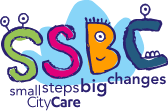Creating a Trauma-informed Workforce
In March 2023, Small Steps Big Changes (SSBC) played host to 250 health, social care, and voluntary sector colleagues from across Nottingham and Nottinghamshire at the first of two trauma informed practice conferences planned this year.
The conference ‘Creating a Trauma-informed Workforce’ and the follow-on conference ‘Conversations that make a difference’ due to be held in June 2023 have both been designed to support the Nottingham and Nottinghamshire Trauma Informed Strategy and are aimed at workforce colleagues, researchers and partner organisations who support trauma, adversity, and trauma informed care through their work with families.
In Nottingham, SSBC realise that building a trauma informed workforce is pivotal to understanding the negative impact of trauma that not only affects the families and children that we work with but also our workforce.
Donna Stenton-Groves, Clinical Lead and Honorary Assistant Professor of Trauma Informed Practice at the University of Nottingham was the first keynote speaker of the day, with a presentation entitled ‘What is trauma, adversity and trauma-informed care? Creating shared language across our public and voluntary sectors’ which focused on the development of the Nottingham and Nottinghamshire Trauma Informed Strategy. As part of her involvement with this work, Donna held workshops with colleagues from across both public and voluntary sector organisations alongside people who had lived through trauma, such as domestic and sexual abuse. The aim of these workshops was to gain a range of perspectives on what trauma means to different individuals and to use this to inform the strategy in a way that would be meaningful.
As the workshop attendees started to discuss their experiences it became clear that there were a lot of similarities between people working in trauma, adversity, and trauma informed care and those who had lived experience of trauma.
These workshop discussions were able to determine that trauma informed care shouldn’t be considered in isolation, but needs to bring together a shared ideology, language and framework across systems and organisations based on the nine principles of a trauma informed approach:
1. Recognition
2. Safety
3. Resist re-traumatisation
4. Trustworthiness and transparency
5. Collaboration and mutuality
6. Empowerment, choice, and control
7. Peer support and mutual help
8. Cultural, historical and gender issues
9. Pathways to trauma – specific care.
The second keynote speaker of the day was Dr Suzanne Zeedyk, Developmental Psychologist and Research Scientist at the University of Dundee, who spoke firstly about ‘The power of relationships’ and then in a second address: ‘The development of children’s stress systems’.
Suzanne explained how trauma is subjective and can only be defined through an individual’s own internal processes and the relationships they have with others. She spoke about how relationships are two-way processes which are wired into our bodies from the earliest stages of development; sharing examples of how babies have been shown to copy movements such as finger pointing when only hours old, followed by imitating facial expressions, and reading their mothers body movements by pulling out their arms and lifting their heads at two and three months respectively.
As part of her address on ‘The development of children’s stress systems’, delegates were shown a poignant video of a child being separated from her parents as part of usual hospital practice in the 1950s. Suzanne explained how the removal of a familiar parent/caregiver would have activated the child’s sympathetic nervous system, triggering an acute stress response that prepared her body to fight or flee.
This was followed by an audience discussion around the long-term impact that this experience would have had on the child.
The conference certainly gave everyone a lot to think about and to take away:
Abby, Health Visitor for the Transient Team works with refugees and asylum seekers who have been impacted by trauma: “The conference has made me think more about how I will change my own practice and spend more time discussing those crucial parent-child interactions with evidence and videos shown today”.
Martha, Youth Support Worker said, “I found the sessions very informative and eye opening; the use of videos/stories added new perspectives to learning.”
Suravi, a doctor, said, “I thoroughly enjoyed the conference, and it has bought the power of parent-child relationships to the forefront of my mind. I will now be teaching other junior doctors about this to build a more trauma-informed culture”.
For a workforce that is still recovering from the isolation and stress left by the covid-19 pandemic, a message that shone through was the excitement felt by everyone at the opportunity to come together with other colleagues to learn, network and share ideas together.
At the end of the conference, there was a real will and desire for organisations and services to work together to tackle childhood trauma and poor health outcomes arising from lifelong stress factors and in doing so build a trauma informed culture with a shared understanding and ideology for the benefit of all.

 Contact the Aspley Family Mentor Hub
Contact the Aspley Family Mentor Hub  Contact the Bulwell Family Mentor Hub
Contact the Bulwell Family Mentor Hub  Contact the Hyson Green and Arboretum Family Mentor Hub
Contact the Hyson Green and Arboretum Family Mentor Hub  Contact the St Ann’s Family Mentor Hub
Contact the St Ann’s Family Mentor Hub 